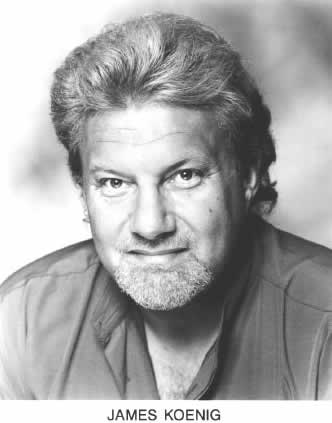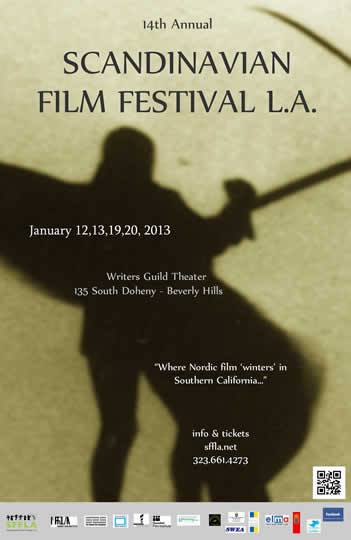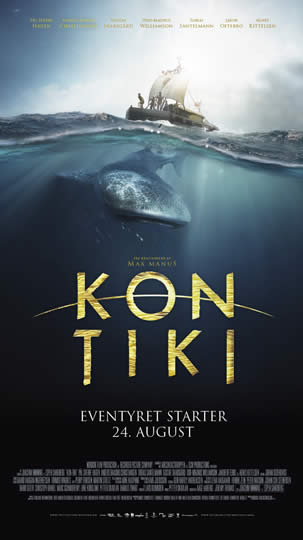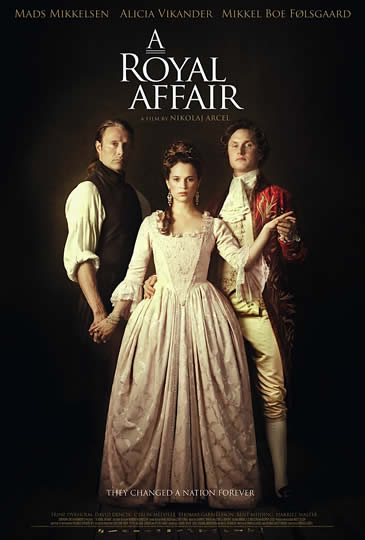 This week we had the opportunity to interview James Koenig, director of Scandinavian Film Festival, LA, about the 2013 festival. James Koenig is used to both sub and super-titles in his dealings with foreign language film and in his non-film endeavors as a classical singer. In fact, his voice has been heard in various arts arenas -not only as a singer, but also as an arts advocate, writer, director, commentator, and teacher. He has served on juries evaluating both singers, and films. He is the founder/director of the 14 year old SFFLA.
This week we had the opportunity to interview James Koenig, director of Scandinavian Film Festival, LA, about the 2013 festival. James Koenig is used to both sub and super-titles in his dealings with foreign language film and in his non-film endeavors as a classical singer. In fact, his voice has been heard in various arts arenas -not only as a singer, but also as an arts advocate, writer, director, commentator, and teacher. He has served on juries evaluating both singers, and films. He is the founder/director of the 14 year old SFFLA.
Bijan Tehrani: Organizing Scandinavian Film Festival, Los Angeles should be a huge challenge; your festival could be called a truly independent film festival, carried on your own shoulders. What motivates you to go through so much work every year?
James Koenig: It is true– the festival is a lot of work! More than anyone realizes, I think. It is, as you said– a huge challenge. Sometimes I ask myself, “Are you CRAZY?!” But I know the answer to that already. I do have my “WHY” moments! Then I recall the faces of our audience– the three teen-age buddies who came to the festival for the first time a few years and discovered foreign language film. Last year, one of them said–“I’ve started college and I’m majoring in film!” And I remember the old Finnish gentleman who took my hand and with tears in his eyes thanked me over and over after seeing a film about a boy in wartime Finland who was one of the kids sent away to safety in Sweden. “That’s my story!” he said. “I was one of those kids. That’s my story. And nobody has told it before.” Or I recall the lively discussions both in the theater and in the lobby “I LOVED that film!” “I hated that film.” I’ve learned that inevitably, the film I like the least will always be “somebody’s” favorite. I recall the great Swedish director Roy Andersson in a discussion in the lobby. His surrealistic images were challenging but in person he was like a gentle grand-father. “How did you get that shot? “asked some L.A. filmmakers? It was brilliant….” And others saying “Are you so skeptical of modern society?” to which he answered matter-of-factly “Ja, I guess I am.” Or the doctor who saw a film “Simple Simon” that portrayed someone with aspergers syndrome. She raised her hand during the Q & A and said. “This is my specialty, and I want you to know, you ‘got it’! I want to show this film to patients and families. And on it goes—
Just before I began the festival I was invited to a small private screening of Liv Ullman’s directorial debut film “Sophie.” I thought– “There are wonderful films like this out there, and all too few opportunities to see them.” The idea was born. And it grew. Suddenly it’s fourteen years later. From the first year on, one thing was clear– there is an interest in these films and filmmakers. There is an interest in dining from a different menu of film. And I also believe that people are becoming friendlier with sub-titles. Diversity is reality– and a real gift of modern culture. Taking the linguistic flavor of languages away is like taking the spices away from food. But, back to your question– the festival is a huge challenge, and a huge responsibility. It is fraught with frustrations– permissions, personalities, fund raising, nit-picking, advertising, people, press, scheduling, shipping, communications, hosting. And a lot of it happens during the holidays– That makes for some “Why?!!!” moments for sure. But in the end, we get to see people brought together around the shared experience of film and they come out fed– and not just fed– nourished, nurtured, moved, stirred up, turned around, and turned on! We see them moved from fears to tears, from pickled to tickled, from memory to magic. That is the power of film. Film is the vehicle of our time travel! Motivation–
I should add that it is also very inspiring to see people brought together around varied stories, varied languages, varied experiences and find that the issues and experiences– the stories– don’t end up with us stuck in our differences so much as they affirm our common humanity.
BT: What should we expect to see in the 2013 festival?
JK: I say that the 2013 SFFLA “sets sail” because many of our films are at sea. This isn’t so uncommon for Nordic peoples. The sea is both what divides and what connects. The Norwegian film Kon-TIki takes us to Easter Island with Thor Heyerdahl, and into the chilly waters of the North Atlantic in Icelandic director Baltasar Kormakur’s THE DEEP. A ROYAL AFFAIR from Danish director Nikolaj Arcel is a wonderful period piece giving history flesh and blood. PURGE– the Finnish Oscar submission from Antti Jokinen is an Estonian story ranging from Soviet take-over in the early 20th century to liberation in the early 90’s. It is an untold part of history– of purges, and occupation, and the history of a somewhat unreported holocaust. The acting is incredibly good. With an Estonian story as a beginning we reached out across the Baltic waters to include films from Latvia– the North American premier of the  Latvian Oscar submission GULF STREAM UNDER THE ICEBERG from Yevgeni Pashkevich, and a revisit to Lithuania’s first Oscar submission LOSS from Maris Martinsons. We are also screening a German-Norwegian co-production MERCY from Matthias Glasner co-sponsored by the Goethe Institut of Los Angeles. And we delve into the horrors of Norwegian folk lore with THALE, co-sponsored by Screamfest! It’s a tale you won’t want to miss as “CSI-Norway” delves into the super-natural. And we have THE LAST SENTENCE from Jan Troell. Troell, who is of the same generation as Ingmar Bergman, is a master. We have short-listed shorts– 9 Meter from Denmark, and KIRUNA KIGALI from Sweden. And we have two very special documentaries— LIV & INGMAR, and PALME.
Latvian Oscar submission GULF STREAM UNDER THE ICEBERG from Yevgeni Pashkevich, and a revisit to Lithuania’s first Oscar submission LOSS from Maris Martinsons. We are also screening a German-Norwegian co-production MERCY from Matthias Glasner co-sponsored by the Goethe Institut of Los Angeles. And we delve into the horrors of Norwegian folk lore with THALE, co-sponsored by Screamfest! It’s a tale you won’t want to miss as “CSI-Norway” delves into the super-natural. And we have THE LAST SENTENCE from Jan Troell. Troell, who is of the same generation as Ingmar Bergman, is a master. We have short-listed shorts– 9 Meter from Denmark, and KIRUNA KIGALI from Sweden. And we have two very special documentaries— LIV & INGMAR, and PALME.
BT: Will there be any guest filmmaker this year?
JK: We are always pleased to have guest filmmakers with us– and both on and off-screen talent. We will have a great delegation from KON-TIKI– both directors– Joachim Rønning, and Espen Sandberg, and the screen writer Petter Skavlan, and lead actor Pal Hagen. We will have ROYAL AFFAIR director Nikolaj Arcel, the director of PALME, and the wonderful Finnish star of STARS ABOVE– Irina Bjorklund. Irina’s husband Peter Franzen is one of the lead actors in PURGE. These two incredible artists are the “Brad and Angelina” of Finland, but lives a good deal of the time in Los Angeles for new explorations here. We’ve seen both in performances that would be Academy Award nomination performances here.
BT: Are any of the films selected for Oscars at the festival?
JK: We have four of the five Nordic Oscar submissions for “Best Foreign Language Film”— Denmark- A ROYAL AFFAIR; Finland–PURGE; Iceland– THE DEEP; and Norway– KON-TIKI. We also have among our Baltic offerings the Latvian Oscar submission–GULF STREAM UNDER THE ICEBERG. Three of the Nordic films– Denmark, Iceland, and Norway are “short-listed.” As well as two short-listed shorts– Denmark’s 9 METER, and from Sweden KIRUNA-KIGALI.
BT: Among the films screened this year are there any LA or US premieres?
JK: We have several North American premiers– the Swedish film GOOD LUCK AND TAKE CARE OF EACH OTHER from Jens Sjögren; the Latvian film GULF STREAM UNDER THE ICEBERG from Yevgeni Pashkevich.
BT: What are the dates of the festival and how can people attend the festival?
JK: Our dates are Jan 12, 13, 19, 20– the Saturday and Sunday of two week-ends.
BT: Please tell us about the sponsors of your festival.
JK: Our sponsors include our parent organization– the American Scandinavian Foundation of Los Angeles, The Barbro Osher Pro Suecia Foundation; ELMA (European Languages and Movies in America); The Swedish Consulate in San Francisco, the Norwegian Consulate in San Francisco, the Embassy of Denmark, SWEA (Swedish Women’s Educational Association; and various individual donors.
BT: Does Scandinavian Film Festival, Los Angeles helps Scandinavian cinema to find distribution chances in US?
JK: We always say that we are a cultural event– but we are a cultural event in the film capital of the world. Those who have business to do have found our festival very helpful. People have found distributors, agents, management, and buyers through SFFLA. And the incredible opportunities for networking have resulted in all sorts of projects for both on-screen and off-screen talent.
BT: What is the state of filmmaking in Scandinavian countries today and does festival reflects that in its programing?
JK: Film is popular and profitable in all of the Nordic countries. While there is a unique “film-finger-print” for each country, there is also a lot of cooperative effort that transcends borders.
BT: How do you see the future of your festival?
JK: My dream is to have the kind of funding that would allow us to do occasional screenings throughout the year– so our audience isn’t left in a “feast or famine” situation. Surely there are Nordic films that are screened at various festivals– but our focus is on films from these countries in the far north of Europe. Nordic film alone counts for 10% of all of European films. Our focus is also on film as an art form and cultural marker– we are, in fact, a cultural event. But there is business associated with cinema culture and we want to be helpful to those who have business goals to accomplish. Ultimately, we want to connect films with audience– to connect art with audience. Visual art requires an eye. We also recognize that some “art” is not particularly commercial, but still deserves an audience. Ancient people gathered around the light of camp-fires. Stories were exchanged. Experiences were related. Dreams were shared. We gather around the light of a projector– and share our stories. At some we laugh, at some we cry. Some are disposable. Some are vital to remember. Some inspire outrage. Others justice. Others caution. Others courage. Some lead to action or to healing. But it all starts in the sharing– and that’s what we do.

